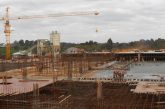
Steel prices has increased with the cost of some items increasing by Sh2,000 in weeks resulting to contractors and prospective home owners facing hard time as the former accuse the latter of trying to rip them off.
The sharp rise in prices is also testing the manufacturing sector, which is part of the Big Four programmes identified as pillars of President Uhuru Kenyatta’s legacy. For instance, the 3 by 3 by 14 gauge (3x3x14g) steel tube was retailing at Sh3,500 in August, but in four months, the cost has risen to Sh5,500. Prices for the same tube currently vary from Sh5,350 to Sh5,650.
The Kenya Association of Manufacturers (KAM), through its Metal and Allied Sector chairperson Bobby Johnson explained that the recent increase in the rate of power and increase in global steel prices also resulted in an increase of prices locally.
Forex exchange fluctuations
“The fluctuations in the prices are a result of forex exchange fluctuations, which are likely to affect Kenya since we are not naturally advantaged to have iron ore, a basic raw material in the production of steel,” said Mr Johnson.
The chairperson urged companies and stakeholders in the steel industry to invest in innovative technology to improve the quality of products at a lower cost and counter the growing competitive market.
In 2015, iron and steel imports were valued at Sh91.2 billion but the amount reduced significantly to Sh14.4 billion in 2019 after the government introduced incentives to support local manufacturing. However, despite the efforts the ever changing prices are yet to stabilise. This is a worrying trend especially when the iron and steel industry forms about 13% of the manufacturing sector, according to the Vision 2030 Manufacturing Sector report.
Impact
Mr Makomirah Matylo, a construction foreman is among the contractors facing the impact on the changing cost of steel. According to the foreman, who has built skyscrapers, schools, blocks of flats and swimming pools. Things became worse in July last year, when the fluctuations became too many.
“We use the BQ to get materials to work on projects. The constant changing of prices is a real challenge especially when they shoot upwards. Clients do not respond well when there is a rise. They rely on us to know the price. At times there is a standstill because they want you to work with the fixed budget that you had agreed on earlier,” said Mr Matylo.
In December, the prices of the D8, D10 and D12 metal bars were Sh500, Sh900 and Sh1,000 respectively. In January, the prices shot up, with the D8 now going for Sh700, D10 Sh1100 and the D12 now retailing at Sh1,400.
The prices for the steel tubes, also known as hollow structural section metals, also shot up. The 1x1x18g, previously sold at Sh750, now goes at Sh900. The 2x2x18g tube, which two weeks ago retailed at Sh1,300 is now being sold at Sh1900 — a massive Sh600 increment.
Like Mr Matylo, Mr Omito who runs a hardware shop in Ruaka, Kiambu has also had to deal with unhappy customers, whom he says do not understand that pricing is beyond his control.
“Some customers, upon hearing the new prices do not even wait, they simply turn and walk away. We are calling on the government to come up with a way of regulating the prices without directly affecting the principles of a free market,” Mr Omito said.
Shifting demand and supply curves
With Kenya being a free market where prices are determined by the shifting demand and supply curves, it will be a tough task for the government to issue prices for every commodity in the steel sector. However, retailers suspect there are some people who are benefiting from the instability in the sector, and want the government to streamline it.
The Competition Authority of Kenya (CAK) in response to the complaints raised by players in the sector, said they are looking into the industry to unearth the cause of the instabilities.
“The authority is aware that prices have been volatile in several sectors, especially those that rely on imports. Price fluctuations are caused by several factors, including the forces of supply and demand as well as other externalities. If the authority determines that the fluctuation is due to infringement of the Competition Act, we shall invoke the relevant provisions of law to remedy the situation,” said CAK’s communications and external relations manager, Mr Mugambi Mutegi.





